2016年新仁爱版八年级英语上册Unit3-4导学案(共19课时)
仁爱版八年级英语上册导学案:Unit4 Topic 3 The Inte

范县濮城镇中学导学案八年级英语上活页导学案导学案总编号61主备人南红霞审核人赵福华审批人授课人授课时间班级姓名小组课题Unit4 Topic 3 Section C 课型探究课课时3.Some young people usually spend too much time playing games and so on译:___________________________________语法:①主语(人)spend some money/some time on sth 介词on后接名词或代词eg.Kitty spends two hours_____her homework.②主语(人)spend some money/some time (in )doing stheg. They spend 2000__________this TV(buy)4.The Internet makes our lives easier and more interesting.翻译:_______________________________总结:make用法:_______________________________________________________________________________________________________________________________5.How long do you spend on the Internet every day?翻译;____________________________________________how long对时间段提问。
How long can I ___________(borrow) the book?试用how long 造句:__________________________________________________三、根据2b讨论并编写对话总结与反思:学法指导栏学习目标1. 识记本课单词和短语;2. 学习并熟记一些常用的重点句型结构;3.熟读课文,回答问题学习重点Spend 用法学习难点Safe / make用法教师“复备栏”或学生“笔记栏”【学习流程】一、短语挑战记忆力(1) 各种各样的________________ (2)和他人分享___________(3)网上聊天____________ (4)发邮件__________________(5)交朋友_____________ (6)看电影______________(7)获取信息_____________ (8)等等________________二、美句赏析1.We can get all kinds of information on the Internet and share it with others.翻译;_________________________________________语法:(1)all kinds of “各种各样的”; different kinds of “不同种类的”例题:There are all kinds of ______ in the library.(book)(2)Share sth ____sb 和某人分享某物仿写: ________________________________________________________________________________________________________________________________________________2.We should use it safely翻译:_____________________________________________________语法:safe.安全的,形容词 ,形容词修饰名次;系动词后跟形容词。
2016仁爱版八年级英语上册导学案完整修改版

111仁爱版八年级英语导学案Unit1 Playing sportsTopic1 Are you going to play basketball? Section A学习目标:1.掌握Page1—2的单词,重点短语及句型。
2.熟练掌握“be going to +动词原形”的结构表示的一般将来时。
学习重难点:1.一般将来时来时概念:表示将要发生的动作或存在的状态及打算、计划或准备做某事。
基本结构:be going to + do(动词原形);.句中一般有以下时间状语:tomorrow, ne xt day(week, month, year…),soon, the day after tomorrow(后天)等。
否定句:1.在be动词(am, is, are)后加not;一般疑问句:be提到句首,some 改为any, and改为or,第一二人称互换。
例如:I’m going to have a picnic this afternoon.→ I’m not going to have a picnic this afternoon.We are going to go on an outing this weekend.→ Are you going to go on an outing this weekend?2. see sb do sth “看见某人经常,习惯性做某事”表示看见事件、行动的全过程,动作已经结束。
see sb doing sth “看见某人正在做某事”强调事件正在进行。
3.have a… game against …“同…进行一场…比赛”4.cheer…on “为某人加油(喝彩)”5.-- Would you like to do sth?-- Sure, I’d love to.6. Me,too.7.动词做主语时要变动名词。
自学引导:1、自学Page1-2的单词。
(根据音标拼读、拼写单词并牢记)。
仁爱版8年级上 Unit 4 Topic3 Section D导学案
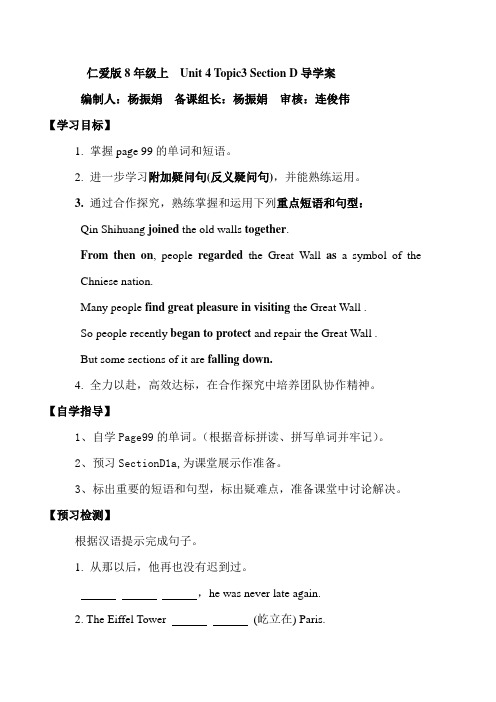
仁爱版8年级上Unit 4 Topic3 Section D导学案编制人:杨振娟备课组长:杨振娟审核:连俊伟【学习目标】1.掌握page 99的单词和短语。
2.进一步学习附加疑问句(反义疑问句),并能熟练运用。
3.通过合作探究,熟练掌握和运用下列重点短语和句型:Qin Shihuang joined the old walls together.From then on, people regarded the Great Wall as a symbol of the Chniese nation.Many people find great pleasure in visiting the Great Wall .So people recently began to protect and repair the Great Wall .But some sections of it are falling down.4.全力以赴,高效达标,在合作探究中培养团队协作精神。
【自学指导】1、自学Page99的单词。
(根据音标拼读、拼写单词并牢记)。
2、预习SectionD1a,为课堂展示作准备。
3、标出重要的短语和句型,标出疑难点,准备课堂中讨论解决。
【预习检测】根据汉语提示完成句子。
1.从那以后,他再也没有迟到过。
,he was never late again.2. The Eiffel Tower (屹立在) Paris.3. 高老师把她的学生当自己的孩子一样看待。
Miss Gao her students her own children.4.将这两部分连接起来。
the two parts .5.但是城墙的一些部分正在倒塌。
But some sections of it are .6.我们将会从学英语中获得极大的乐趣。
We’ll great English.【合作探究】1.组内讨论解决自学引导中的疑难问题。
仁爱版八年级上英语导学案___Unit3_topic3
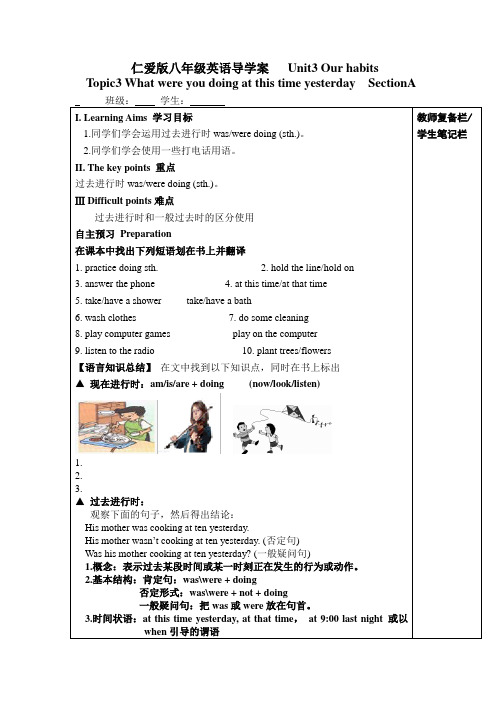
1.概念:表示过去某段时间或某一时刻正在发生的行为或动作。
2.基本结构:肯定句:was\were+doing
否定形式:was\were+not+doing
一般疑问句:把was或were放在句首。
3.时间状语:at this time yesterday, at that time,at 9:00 last night或以when引导的谓语
▲pleasant:令人愉快的;舒适的(主语物)形容词
pleased: (某人)高兴的,喜欢的;满意的(主语人)形容词be pleased to do高兴做某事
pleasure愉快,高兴;满足(不可数名词)
The walk was very__________.那次散步很愉快。
I had a __________ trip last summer.去年夏天我做了一次很愉快的旅行。
1.at that time__________________________________________________
2.football, from 8:00 to 10:00 last night
_____________________________________________________
▲现在进行时:am/is/are + doing(now/look/listen)
1.__________________________________________________________
2.__________________________________________________________
英语八年级(初二)上册Unit3-4教案(含答案)

英语八年级(初二)上册Unit3-4教案(含答案)Unit3 I'm more outgoing than my sister.知识讲解一、语法:形容词、副词的比较级1. 概念:大多数形容词、副词有三个等级:原级、比较级和最高级。
两者比较3. 表示两者在某一方面相同时,用“as+形容词或副词原级+as”的句型。
如:I think science is as important as math.我认为科学和数学一样重要。
4. 表示一方在某一方面不及另一方时,用“not as/so+形容词或副词原级+as”的句型。
如:It is not as/so warm today as yesterday.今天不如昨天暖和。
二、辨析1. be like“就像…”I am like your sister.look like “外貌上的像”I look like my sister.2.both…and…两者都,后面的动词用复数形式Both Tom and Jim are students.3.help sb. to (do) sth. 帮助某人做某事= help sb. with sth. 在某方面帮助某人He often helps me (to)learn English. 他经常帮助我学习英语。
= He often helps me with my English. 他经常在英语方面帮助我。
4. That’s why+句子:那就是…的原因/那就是为什么…That's why I study English hard. 那就是我努力学习英语的原因。
三、短语1. more outgoing 更外向/更开朗2 make friends with sb. 与某人交朋友3. the singing competition 歌咏比赛4. the most important 最重要的5. be talented in music 在音乐方面有天赋6. the same as 与……相同be similar to 与…相似7. care about 关心/留意/关注8. be different from 与…...不同9. be like a mirror 像一面镜子10. as long as 只要;与…...一样长11. bring out 显示/显出12. have fun=Have a good time 玩得开心have fun doing sth 做某事很开心13. reach for 伸手达到/达到14. touch one’s heart 感动15. in fact 事实上16. the other 另一个17. be good with 与…和睦相处同步练习一、根据句意及汉语提示填写单词。
仁爱版八年级英语上册导学案:Unit4 Topic 3 The Inte
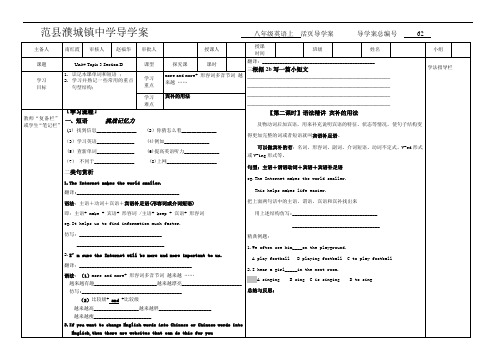
范县濮城镇中学导学案八年级英语上活页导学案导学案总编号62主备人南红霞审核人赵福华审批人授课人授课时间班级姓名小组课题Unit4 Topic 3 Section D 课型探究课课时翻译:_____________________________________________三根据2b写一篇小短文____________________________________________________________________________________________________________________________________________________________________________________________________【第二课时】语法精讲宾补的用法及物动词后加宾语,用来补充说明宾语的特征、状态等情况,使句子结构变得更加完整的词或者短语就叫宾语补足语。
可以做宾补的有:名词、形容词、副词、介词短语、动词不定式、V-ed形式或V-ing形式等。
句型:主语+谓语动词+宾语+宾语补足语eg.The Internet makes the world smaller.This helps makes life easier.把上面两句话中的主语、谓语、宾语和宾补找出来用上述结构仿写:_____________________________________________________________________精典例题:1.We often see him____on the playground.A play footballB playing footballC to play football2.I hear a girl_____in the next room.A singingB singC is singingD to sing总结与反思:学法指导栏学习目标1. 识记本课单词和短语;2. 学习并熟记一些常用的重点句型结构;学习重点more and more+ 形容词多音节词越来越……学习难点宾补的用法教师“复备栏”或学生“笔记栏”【学习流程】一、短语挑战记忆力(1) 找到信息________________ (2)你猜怎么着______________(3)学习英语_______________ (4)例如__________________(5)查新单词_______________ (6)提高英语听力______________(7)不同于________________ (8)上网____________________二美句赏析1.The Internet makes the world smaller.翻译;_________________________________________语法:主语+动词+宾语+宾语补足语(形容词或介词短语)即:主语+ make + 宾语+ 形容词 /主语+ keep + 宾语+ 形容词eg.It helps us to find information much faster.仿写:____________________________________________________________________2.I’m sure the Internet will be more and more important to us.翻译:_____________________________________________语法:(1)more and more+ 形容词多音节词越来越……越来越有趣_________________________越来越漂亮________________________仿写;________________________________________(2)比较级+ and +比较级越来越高__________________越来越胖_____________________越来越瘦_______________________3.If you want to change English words into Chinese or Chinese words into English,then there are websites that can do this for you。
2016年新仁爱版八年级英语上册全一册导学案(精编)
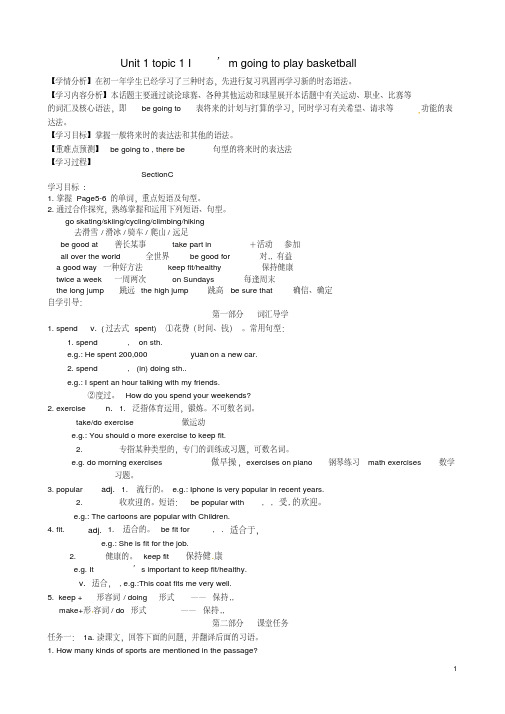
2.
健康的。 keep fit 保持健 康
e.g. It
’ s important to keep fit/healthy.
v. 适合, , e.g.:This coat fits me very well.
5. keep + 形容词 / doing 形式 —— 保持 ,,
make+形 容词 / do 形式
2.
一周两次
3. 去爬山
4.
跳高
—— 保持 ,,
第二部分 课堂任务
任务一: 1a. 读课文,回答下面的问题,并翻译后面的习语。
1. How many kinds of sports are mentioned in the passage?
1
_____________________________________________________
4. How can she play basketball now?
__________________________________________________
5. What events is she going to take part in at the school s
ports meet?
2.
收欢迎的。短语: be popular with , , 受, 的欢迎。
e.g.: The cartoons are popular with Children.
4. fit.
adj. 1. 适合的。 be fit for
, . 适合于,
e.g.: She is fit for the job.
5. the day after tomorrow _____________6.
【公开课导学案】仁爱八年级上册Unit 4Topic 3 导学案

Review Unit 4 Our World Topic 3 导学案Guide 1复习内容:完成下列汉译英。
复习方法:组内互背。
复习要求:通过完成汉译英的训练, 能够掌握所学单词和短语1. cheap2. online3. information4. language5. website6. perfect7. true 8. correct 9. search10. dictionary 11. expensive 12. improve13.产生,形成14.把...放到...里. 15.查阅,查找16…重要的组成部分17.面对面18.购物19.面对面20.寄邮件21.在网上22.骗钱23.投入使用Test 1 综合填空The Internet is _________(重要) for people today. More and more people use it every day. The Internetcan help us do a lot of things. We can s________ for__________ _(信息 ) on different w___________. We can also learn any__________ [‘læŋgwɪdʒ] that we need.The Internet may be fast and easy, but it is not p________. So we should know how to use it ________(正确地). If you do, you can really have a wonderful life with the Internet.Test 2 选择填空( )1. Some people use the Internet ___ others.A. hurtingB. for hurtC. to hurt( )2.If you don’t know how to use the word s, you should _________ in a dictionary.A. look up itB. look it upC. look them up( )3. I often ______ the Internet ______ some information during my study.A. look; forB. search; forC. wait; for( ) 4. —I _______ a wallet on my way home yesterday. I handed it to the police and now they are _____ whose it is.—It’s very kind of you.A. found; finding outB. found out; findingC. found; found outGuide 2复习内容:做下列习题复习方法:先独立做,然后小组讨论。
仁爱版八年级英语上册Unit3T3导学案及教学反思
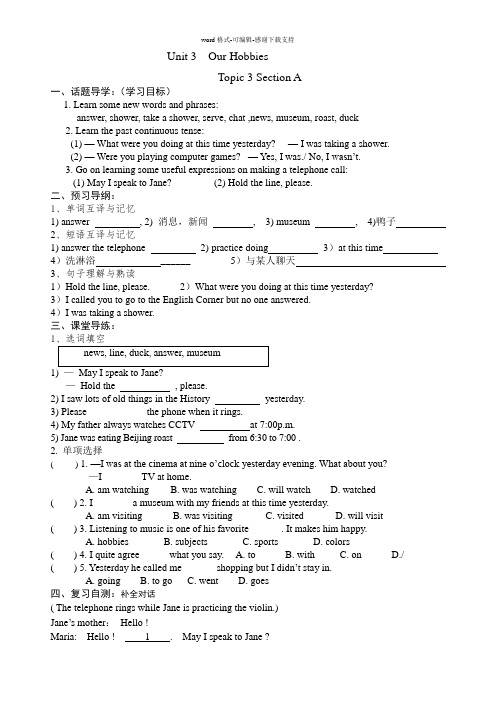
Unit 3 Our HobbiesTopic 3 Section A一、话题导学:(学习目标)1. Learn some new words and phrases:answer, shower, take a shower, serve, chat ,news, museum, roast, duck2. Learn the past continuous tense:(1) — What were you doing at this time yesterday? — I was taking a shower.(2) — Were you playing computer games? — Yes, I was./ No, I wasn’t.3. Go on learning some useful expressions on making a telephone call:(1) May I speak to Jane? (2) Hold the line, please.二、预习导纲:1、单词互译与记忆1) answer , 2) 消息,新闻, 3) museum , 4)鸭子2、短语互译与记忆1) answer the telephone 2) practice doing 3)at this time4)洗淋浴 ______ 5)与某人聊天3、句子理解与熟读1)Hold the line, please. 2)What were you doing at this time yesterday?3)I called you to go to the English Corner but no one answered.4)I was taking a shower.三、课堂导练:1—Hold the , please.2) I saw lots of old things in the History yesterday.3) Please ___________ the phone when it rings.4) My father always watches CCTV at 7:00p.m.5) Jane was eating Beijing roast from 6:30 to 7:00 .2.单项选择( ) 1. —I was at the cinema at nine o’clock yesterday evening. What about you?—I _______ TV at home.A. am watchingB. was watchingC. will watchD. watched ( ) 2. I _______ a museum with my friends at this time yesterday.A. am visitingB. was visitingC. visitedD. will visit ( ) 3. Listening to music is one of his favorite ______. It makes him happy.A. hobbiesB. subjectsC. sportsD. colors( ) 4. I quite agree _____ what you say. A. to B. with C. on D./ ( ) 5. Yesterday he called me ______ shopping but I didn’t stay in.A. goingB. to goC. wentD. goes四、复习自测:补全对话( The telephone rings while Jane is practicing the violin.)Jane’s mother:Hello !Maria: Hello ! 1 . May I speak to Jane ?Jane’s mother : 2( Jane answers the telephone.)Jane: Hello , Maria!Maria: Hello ! 3Jane: I’m practicing the violin.Maria: What were you doing at this time yesterday? 4Maria:1. ___________2.______________3.____________4. _______________5.______________五、课文解读:1. Hold the line, please. 请别挂断电话。
仁爱英语八年级上Unit3_Topic_Section_AD导学案
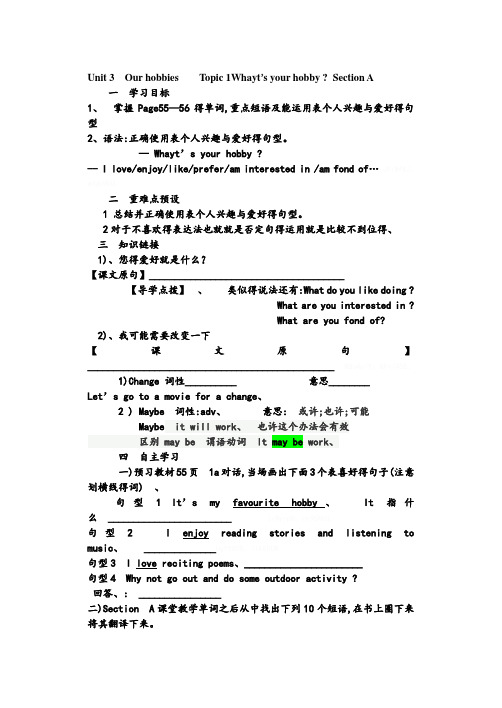
Unit 3 Our hobbies Topic 1Whayt’s your hobby ? Section A 一学习目标1、掌握Page55—56得单词,重点短语及能运用表个人兴趣与爱好得句型2、语法:正确使用表个人兴趣与爱好得句型。
-- Whayt’s your hobby ?-- I love/enjoy/like/prefer/am interested in /am fond of…二重难点预设1 总结并正确使用表个人兴趣与爱好得句型。
2对于不喜欢得表达法也就就是否定句得运用就是比较不到位得、三知识链接1)、您得爱好就是什么?【课文原句】______________________________________【导学点拨】、类似得说法还有:What do you like doing ? What are you interested in ? What are you fond of?2)、我可能需要改变一下【课文原句】________________________________________________1)Change 词性__________ 意思________Let’s go to a movie for a change、2 ) Maybe 词性:adv、意思:或许;也许;可能Maybe it will work、也许这个办法会有效区别 may be 谓语动词 It may be work、四自主学习一)预习教材55页1a对话,当场画出下面3个表喜好得句子(注意划横线得词) 、句型 1 It’s my favourite hobby、It 指什么________________________句型 2 I enjoy reading stories and listening to music、______________句型3 I love reciting poems、_______________________句型4 Why not go out and do some outdoor activity ?回答、: ________________二)Section A课堂教学单词之后从中找出下列10个短语,在书上圈下来将其翻译下来。
仁爱科普版英语八年级上册导学案:Unit 4 Topic 3
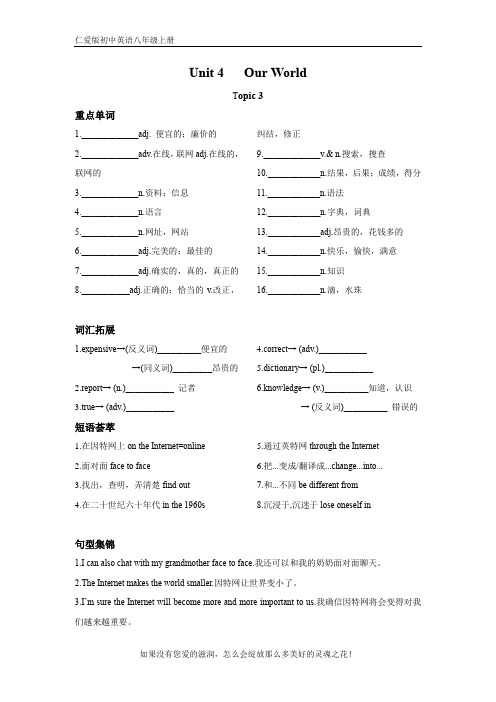
Unit 4 Our WorldT opic 3重点单词1._____________adj. 便宜的;廉价的2._____________adv.在线,联网adj.在线的,联网的3._____________n.资料;信息4._____________n.语言5._____________n.网址,网站6._____________adj.完美的;最佳的7._____________adj.确实的,真的,真正的8.___________adj.正确的;恰当的v.改正,纠结,修正9._____________v.& n.搜索,搜查10.____________n.结果,后果;成绩,得分11.____________n.语法12.____________n.字典,词典13.____________adj.昂贵的,花钱多的14.____________n.快乐,愉快,满意15.____________n.知识16.____________n.滴,水珠词汇拓展1.expensive→(反义词)__________便宜的→(同义词)_________昂贵的2.report→ (n.)___________ 记者3.true→ (adv.)___________4.correct→ (adv.)___________5.dictionary→ (pl.)___________6.knowledge→ (v.)__________知道,认识→ (反义词)__________ 错误的短语荟萃1.在因特网上on the Internet=online2.面对面face to face3.找出,查明,弄清楚find out4.在二十世纪六十年代in the 1960s5.通过英特网through the Internet6.把...变成/翻译成...change...into...7.和...不同be different from8.沉浸于,沉迷于lose oneself in句型集锦1.I can also chat with my grandmother face to face.我还可以和我的奶奶面对面聊天。
最新仁爱版英语八年级上册Unit4 Topic3 SectionA导学案

Unit4 Topic3The Internet makes the world smallerSection AStep1.Learning aims:1.listen, say, read and write the new words:cheap,online,information,language,headmaster2. Use these phrases to make sentences:chat with sb, face to face , make sth into use,find out the information, send e-mails.....3.Learn the structure of:主语(Subject)+谓语(Verb)+宾语(Object)+宾语补足语(Object Complement)Step2.Let's talk.What do you often do at weekends?Step 3.Learn some new words.(图片导入)(1)Read after the radio.(2) Read together.(3)Stand up and remember them.(4)Let’s have a check.Step4.Learn 1a.(1) Listen to 1a and find out the answer.When did the Internet come into being?(2)Read 1a after the tape.(3)Read 1a together.(4)Read 1a in roles.(5)Practice :①Finish1b.Kangkang and Maria are talking about the Internet. We use the Internet to _______ information, _____ emails, listen to music and so on. The Internet is great and makes the world _________. It works with a special __________. Scientists started __________ the Internet in the 1960s and _________________ in the 1990s. The Internet will become ____________________________ to us.① Remember key points .①Let’s have a check .(play games)Step5.Do some exercises.(1)Look at the pictures and follow the example to make upsentences.(2)Listen to the passage and number the pictures.(3)Listen again and fill in the blanks.The Internet has become a _____________ to find information. _____________, you can buy a bike or a car online. You can also _______ how to study English or cook by __________ online.Many people read books or buy gifts _________ the Internet. Somepeople even find new friends online.As you look toward ____________ , you can imagine many more uses of the Internet.(4)完成课时导学案上的补全对话。
仁爱版八年级上册英语导学案:Unit 3 Topic 1What’s your hobby SectionD
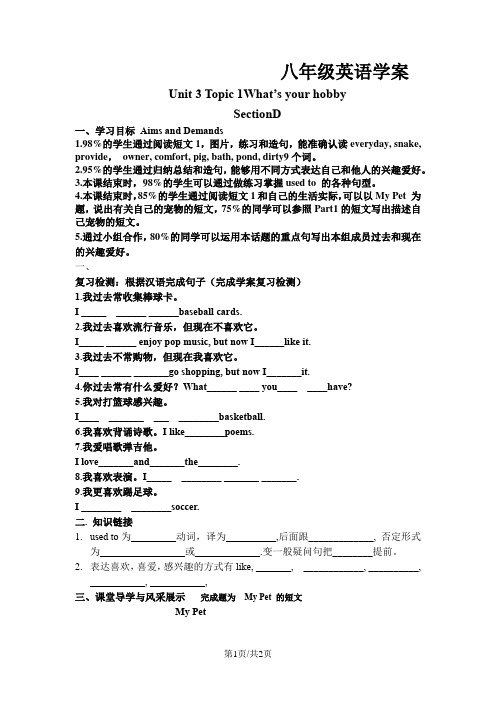
八年级英语学案Unit 3 Topic 1What’s your hobbySectionD一、学习目标Aims and Demands1.98%的学生通过阅读短文1,图片,练习和造句,能准确认读everyday, snake, provide,owner, comfort, pig, bath, pond, dirty9个词。
2.95%的学生通过归纳总结和造句,能够用不同方式表达自己和他人的兴趣爱好。
3.本课结束时,98%的学生可以通过做练习掌握used to 的各种句型。
4.本课结束时,85%的学生通过阅读短文1和自己的生活实际,可以以My Pet 为题,说出有关自己的宠物的短文,75%的同学可以参照Part1的短文写出描述自己宠物的短文。
5.通过小组合作,80%的同学可以运用本话题的重点句写出本组成员过去和现在的兴趣爱好。
一、复习检测:根据汉语完成句子(完成学案复习检测)1.我过去常收集棒球卡。
I _____ ______ ______baseball cards.2.我过去喜欢流行音乐,但现在不喜欢它。
I_____ ______ enjoy pop music, but now I______like it.3.我过去不常购物,但现在我喜欢它。
I____ ______ _______go shopping, but now I_______it.4.你过去常有什么爱好?What______ ____ you____ ____have?5.我对打篮球感兴趣。
I____ _______ ___ ________basketball.6.我喜欢背诵诗歌。
I like________poems.7.我爱唱歌弹吉他。
I love_______and_______the________.8.我喜欢表演。
I_____ ________ _______ _______.9.我更喜欢踢足球。
I ________ ________soccer.二. 知识链接ed to为_________动词,译为__________,后面跟_____________, 否定形式为_________________或_____________.变一般疑问句把________提前。
仁爱英语八上Unit3导学案
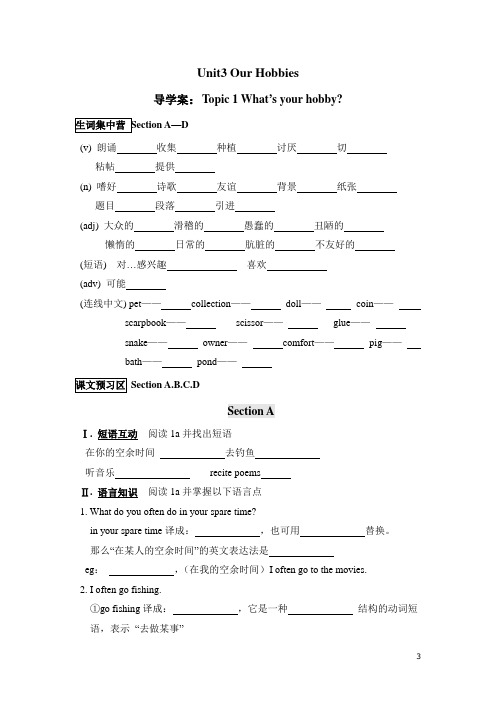
Unit3 Our Hobbies导学案:Topic 1 What’s your hobby?—D(v) 朗诵收集种植讨厌切粘帖提供(n) 嗜好诗歌友谊背景纸张题目段落引进(adj) 大众的滑稽的愚蠢的丑陋的懒惰的日常的肮脏的不友好的(短语) 对…感兴趣喜欢(adv) 可能(连线中文) pet——collection——doll——coin——scarpbook——scissor——glue——snake——owner——comfort——pig——bath——pond——Section A.B.C.DSection AⅠ. 短语互动阅读1a并找出短语在你的空余时间去钓鱼听音乐recite poemsⅡ. 语言知识阅读1a并掌握以下语言点1. What do you often do in your spare time?in your spare time译成:,也可用替换。
那么“在某人的空余时间”的英文表达法是eg:,(在我的空余时间)I often go to the movies.2. I often go fishing.①go fishing译成:,它是一种结构的动词短语,表示“去做某事”②go +v-ing结构很常用,多用于体育活动和业余娱乐活动。
如:去游泳去购物去爬山3. I enjoy reading stories and listening to music.①enjoy意为,其后所跟的动词要用形式。
②类似用法的词有l ike, love, prefer, be fond of, be interested in …eg:The Greens enjoy ( live) in China.I prefer ( walk) to (cycle).I love/like (listen) to the music.4. Why not go out and do some outdoor activities.why not译成:,它的同义词短语是,它们后面所跟的动词要用形式。
仁爱版八年级上Unit 4 Topic3 Section A导学案
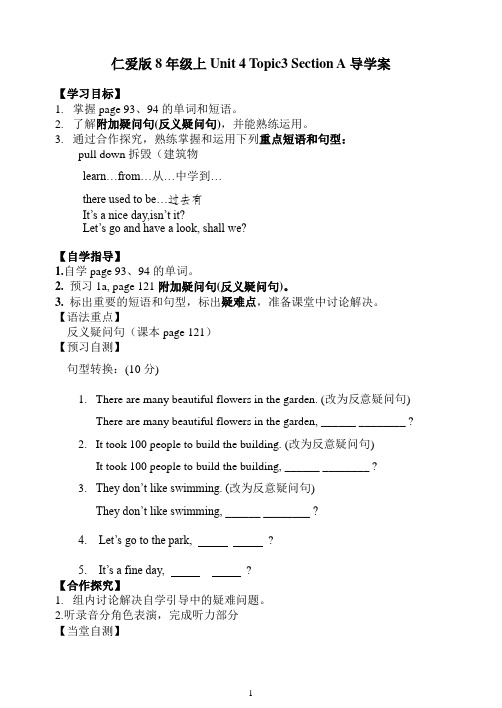
仁爱版8年级上Unit 4 Topic3 Section A导学案【学习目标】1.掌握page 93、94的单词和短语。
2.了解附加疑问句(反义疑问句),并能熟练运用。
3.通过合作探究,熟练掌握和运用下列重点短语和句型:pull down拆毁(建筑物learn…from…从…中学到…there used to be…过去有It’s a nice day,isn’t it?Let’s go and have a look, shall we?【自学指导】1.自学page 93、94的单词。
2.预习1a, page 121附加疑问句(反义疑问句)。
3. 标出重要的短语和句型,标出疑难点,准备课堂中讨论解决。
【语法重点】反义疑问句(课本page 121)【预习自测】句型转换:(10分)1.There are many beautiful flowers in the garden. (改为反意疑问句)There are many beautiful flowers in the garden, ______ ________ ?2.It took 100 people to build the building. (改为反意疑问句)It took 100 people to build the building, ______ ________ ?3.They don’t like swimming. (改为反意疑问句)They don’t like swimming, ______ ________ ?4. Let’s go to the park, ?5. It’s a fine day, ?【合作探究】1.组内讨论解决自学引导中的疑难问题。
2.听录音分角色表演,完成听力部分【当堂自测】情景会话:A: 1B: Yes, it is.A: Excuse me. 2B: Yes, I am.A: 3B: I'm sorry. I can't understand.A: Sorry! I said the bus is late. 4B: No, I’ m not. I come from France, I'm French. A: Really? Do you live in town or in the country? B: In Paris. It's as clean and beautiful as London. A: How interesting! 5B: Yes. They are more friendly than people think. 从下列方框里选出五个合适的选项补全对话:A. You are waiting for the bus, aren't you?B. You are not English, are you?C. They are careful, aren't they?D. It is a beautiful day, isn't it?E. The people in Paris are friendly, aren’t they?F. You are French, aren't you?-G. The bus is late, isn't it?教学反思:。
- 1、下载文档前请自行甄别文档内容的完整性,平台不提供额外的编辑、内容补充、找答案等附加服务。
- 2、"仅部分预览"的文档,不可在线预览部分如存在完整性等问题,可反馈申请退款(可完整预览的文档不适用该条件!)。
- 3、如文档侵犯您的权益,请联系客服反馈,我们会尽快为您处理(人工客服工作时间:9:00-18:30)。
Unit 3 Our Hobbies Topic 1 What’s your hobby?Section A课型:P+S 课时:1Ⅰ。
Objective(学习目标)1.能正确地用英语表达自己的喜好。
2. 能正确地运用不同的方式,如: like/enjoy/prefer/be fond of /be interested in +doing结构来表达兴趣爱好。
3. Key points:1. What’s your hobby? My hobby is...及like/enjoy/prefer/be fond of /be interested in+doing句型。
2. go traveling, collect stamps, walk a pet do g, listen to musicⅡ。
Procedures(学习过程)Before class一、预习指导:1.Read and remember the new words in section A (读准并记忆课文中的单词)。
先读本课新单词,并在书上标出汉语意思和音标。
本课新单词很少,我相信你一定能背会。
试一试,能写出来吗?2.Unlined the following phrases in the article.Read ,understand and try to remember th em.在文中找到并划出下列短语,熟读、理解并记忆。
)在文中找出下列短语,并翻译:①在你的空闲时间___________________ ②去钓鱼_____________③我最大的爱好___________________ ④喜欢读连环画_______________________⑤一个影迷_____________ ⑥常去电影院_____________________________ ⑦租影碟_________________________ ⑧做些户外活动______________________________⑨听着不错___________________________ ⑩需要改变一下__________________3.What do you often do in your free time?What`s your hobby?4.Introduce yourself.(name,age,class,grade,hobby,your friend and his/her hobby)二、预习检测。
完成关于词汇的应用检测。
根据句意及首字母提示补全单词1. I often play soccer in my s time.2. —Do you know his h ? —Yes, he likes listening to musi c.3. He likes old stamps, and he often c them.4. She a many famous persons in plays.5. He is too fat. He n to do more exercise.写下你在预习中的困惑。
Ⅲ。
In classplete the following sentences.(根据课文完成句子)想一想,你能总结出下面的知识点吗?可以借助工具书。
语法重点1.What do you often do in your spare time? 你在空闲时间常做什么?spare adj.空闲的、多余的、剩余的。
spare time(空闲时间) = free time, 此句中的介词短语in your spare time也可换为由when引导的时间状语从句,完整形式为:What do you often do when you have time? =What do you often do in your free time?2.Why not go out and do some outdoor activities? 为什么不出去做一些户外活动?do outdoor activities 做户外活动【链接】in door activities 做室内活动如:I like doing indoor activities. 我喜欢做室内活动。
3.Maybe I need a change. 或许我需要改变一下。
(1)need意为“需要”,即可做实义动词,也可做情态动词。
做实义动词时,有人称和数的变化,后跟动词不定式形式;做情态动词时,无人称和数的变化,后跟动词原形。
如:He need go to school now. 他现在该去上学了。
(做情态动词)He needs to do some sh opping. 他需要购物了。
(做实义动词)(2)change n. (通常指有趣的或令人愉快的)转变,变换如:Let’s go out to a restaurant for a change.. 我们换换口味,到饭店去吃吧。
【拓展】change作名词时还有“零钱”的意思,作动词时有“变化、改变”之意。
如: Here is your change. 找你零钱。
Nobody can change him. 没有人能改变他。
4.I enjoy dancing to music. 我喜欢伴着音乐跳舞。
(1)除了enjoy之外,like, love, prefer, be interested in, be fond of等都可以接名词、代词或动名词,表示喜欢做某事,他们有以下区别:①在含义上:love比like在表达喜爱程度上更深;enjoy表达喜欢时,更侧重“从中享受乐趣”;而be interested in则表示“对,,感兴趣”;prefer表示“两者比较之下更喜欢”;be fond of 相当于like,表示喜欢。
②在用法上:love, like和prefer除了都可以接名词、代词、动名词之外,还可以接动词不定式。
而enjoy, be interested in, be fond of则只能接名词、代词、动名词。
(2)dance to,伴着,,跳舞;跟着,,跳舞如:The children are dancing to the beautiful songs happily. 孩子们正在伴着优美的歌曲快乐的跳舞。
5.Walk a pet dog. 遛狗。
walk在这里是“牵着动物走,遛”的意思。
如:My father often walks a pet dog after supper. 我父亲经常在晚饭后遛狗。
plete the following mind map.(完成下面的思维导图)1)What are Helen and Wen Wei talking about?2)What are Helen and Wen Wei’s hobbies?3) Wen Wei enjoys reading stories and listening. Helen loves recitin g poemshobbies3.Quiz小测验完成短文一、句型转换1. I often go fishing in my spare time.(对画线部分提问)_______ do you often _______ in your spare time?2. I like playing computer games because it is very interesting.(对画线部分提问)_______ _______ you like playing computer games?3. I enjoy listening to music.(同义句转换) I am _______ _______ listening to music.4. She likes reciting poems. (同义句转换) She of reciting poems.二、单项选择( ) 1. Wang Yanbo’s mother is fond of _______.A. collect stampsB. collecting stampsC. collection stampsD. collectedstamps( ) 2. Why _______ go out for a walk after supper?A. d on’tB. didn’tC. notD. doesn’t( ) 3. I like , but today I don’t like .A. reading; readingB. reading; to readC. to read; readingD. to read;to read( ) 4. —Does he often go hiking on weekends?—Yes, he loves .A. do in door activitiesB. doing in door activitiesC. doing outdooractivities学习总结(1)学会:(2)困惑:Ⅳ.After class课后测验与巩固Unit 3 Our Hobbies. Topic 1 What’s your hobby?Section B课型:Grammar 课时:1Ⅰ。
Objective(学习目标)Section B是对Section A的延伸,谈论的内容也从谈论现在的兴趣爱好扩展到了对过去兴趣爱好的谈论,即used to do sth 和它的否定形式used not to do sth/didn’t use to do sth。
Key points:1. used to do sth /used not to do sth/ didn’t use to do sth句型的运用。
2. “s”在清辅音和浊辅音里发音的不同以及/s/和/t/, /d/在一起时的发音。
Difficult points:1. used to肯定和否定形式的运用及转换。
didn’t use to do sth容易写成didn’t used to do sth。
Ⅱ。
Procedures(学习过程)Before class一、预习指导:1.Read and remember the new words in section A (读准并记忆课文中的单词)。
先读本课新单词,并在书上标出汉语意思和音标。
本课新单词很少,我相信你一定能背会。
试一试,能写出来吗?2.小组合作朗读对话1a并翻译对话内容。
3.小组交流讨论完成1c. 3;独立完成1b.2。
